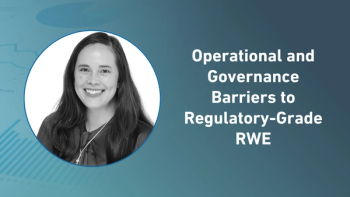
- Applied Clinical Trials-12-01-2022
- Volume 31
- Issue 12
First-hand Perspectives on Achieving True Digital Health Engagement
Final presentation at DIA reminds: "we are all patients."
The eCOA Consortium has served as co-sponsor of the Drug Information Association’s (DIA) Digital Technology in Clinical Trials Conference for the event’s first three years. All have been held virtually so far, delivering insightful and inspirational content that was deserving of a wider audience. This year, the central theme was how patients and sites are engaged in the context of the expanding use of digital health technologies in clinical development.
The committee tasked with developing the conference program aligned on the mindset of the content being progressive, yet honestly practical. Collectively, we aligned on two long-standing challenges—true patient engagement and the technology impact on clinical sites. Building on this, the conference explored the site perspective on digital technology, patient centricity in decentralized trials (DCTs), and regulatory implications for digital health technologies. Sessions also explored the use of AI and machine learning, and offered an intriguing exploration of how patient ownership of their own real-world data might impact clinical development.
Among the wealth of strong material, the final presentation, titled “We are All Patients”—and delivered by my eCOA Consortium colleague, Elena Izmailova, chief scientific officer at Koneksa—left a lasting impact. Izmailova, shared the story of her work utilizing digital technologies to track and support her recovery from cancer treatment.1
Izmailova was diagnosed during the COVID-19 pandemic, which presented a series of challenges. Her knowledge drove her to construct an ad hoc technology kit that not only enabled an informed patient voice, but also delivered insights on her functional status to share with treating physicians in a remote setting. All post-surgery follow-up visits were virtual, and having digital technology-derived data allowed Izmailova to pressure-test sensor-based data collection as a DCT approach. She also used a non-structured patient diary to track symptoms of importance and relevance to her; a complaint among trial participants using electronic patient-reported outcome (ePRO) systems is repeated questioning on the same symptom across different copyrighted measures.
Noting a reduction in post-surgery step count, Izmailova was cognizant of how critical physical activity tracking is to patients, as described in the Ohri et al. 2019 study2 that suggested step count may serve as a predictor of short-term hospitalization risk during chemoradiotherapy. Izmailova took ownership of tracking her activity and used the data to support consultations with the medical team. In discussing her elevated heart rate while walking, the need for an iron infusion was identified to address post-surgical anemia; having objective data to share with physicians was central to the decision to proceed with the infusion.
In essence, Izmailova created an individual trial, an N-of-1, defining her own assessment schedule based on known risks to patients with similar conditions. And there were broader learnings, such as the challenge of sharing data from multiple sources. Systems integration via portals has always focused on the site, but what about the patient? Izmailova’s N-of-1 study suggests the potential value of tracking vital signs and physical activity and provides an example of a methodology to assess data generalizability.1
Izmailova’s story highlights two key concepts; the value of technology and the critical need for meaningful patient engagement. The balance we must strike between delivering on working objectives and the realities of being a patient is a delicate one. We have talked often within the eCOA Consortium about how eCOA systems must adapt to the realities of managing serious disease. Talking the talk of true patient centricity doesn’t solve the realities of invasive methods and patient burden, but we have a duty to empower patients and trial participants with strategies and tools to help them manage their conditions and treatment.
Thankfully, Izmailova has fully recovered and continues to provide outstanding contributions to eCOA Consortium’s work. Beyond that,she reminds us that we are all patients and have a duty to think laterally and progressively to ensure patients are central to their care.
Authored by Scottie Kern, executive director, eCOA Consortium
References
- Izmailova, E; Ellis, D. “When Work Hits Home: The Cancer-Treatment Journey of a Clinical Scientist Driving Digital Medicine.” Journal of Clinical Cancer Informatics, 6 (2022).
- Ohri, N; Halmos, B; Bodner, WR; Cheng, A; Guha, C; Kalnicki, S; Garg, M. “Daily Step Counts: A New Prognostic Factor in Locally Advanced Non-Small Cell Lung Cancer?” International Journal of Radiation Oncology, Biology, Physics. 105(4). Nov. 15, 2019
Articles in this issue
about 3 years ago
How a Global Privacy Standard Can Boost Patient Trustabout 3 years ago
Simultaneous New Drug Submissions: Is it Possible?about 3 years ago
Key Guidance Updates in 2022about 3 years ago
Tips and Tools to Overcome DE&I Challenges in Clinical Trialsabout 3 years ago
Identifying Important Risk Indicators in Clinical Developmentabout 3 years ago
Using Solid Endpoint Strategies for Successful Cancer Trialsabout 3 years ago
Europe’s Debate on AMR Becomes Another Proxy War Over Moneyabout 3 years ago
Pandemic Spurred New R&D Approaches from Pharma, FDA in 2022about 3 years ago
From Present to ‘Post’: Holdover Trends to Watchabout 3 years ago
Applied Clinical Trials December 2022 Issue (PDF)Newsletter
Stay current in clinical research with Applied Clinical Trials, providing expert insights, regulatory updates, and practical strategies for successful clinical trial design and execution.




